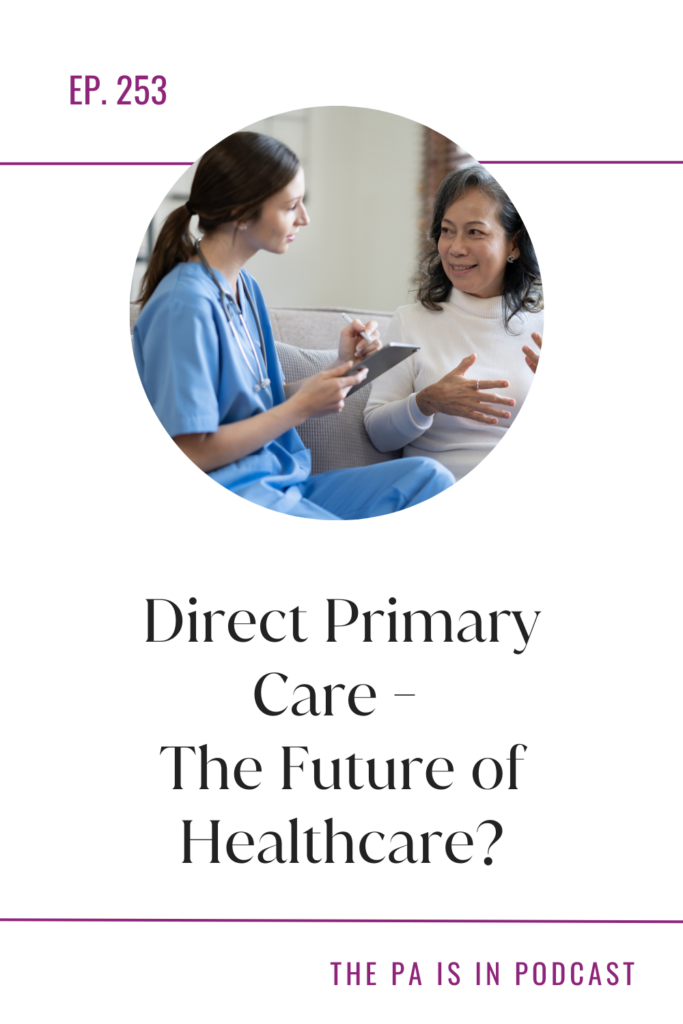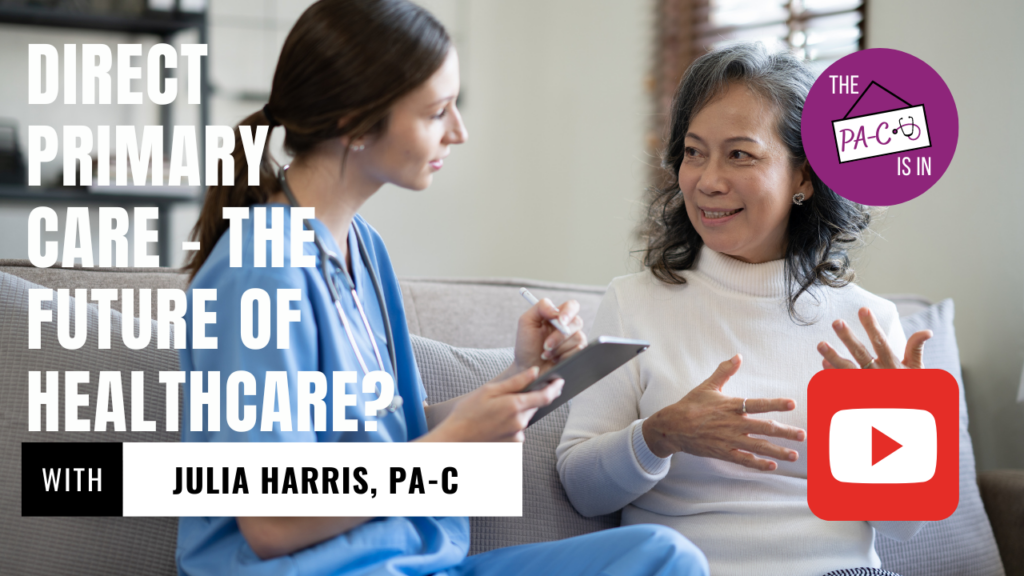
When you graduated PA school and started working your first job as a PA-C, were you surprised by the significant role insurance companies played in dictating how you can treat your patients? Do you feel frustrated by our current healthcare system and how it focuses more on sick patients than on keeping patients healthy? Do you spend most of your time as a Primary Care PA completing insurance prior authorizations and fighting what seems like a never-ending battle to actually care for your patients?
Well look no further! My guest today is PA Julia Harris, who is here to explain all about the Direct Primary Care model of healthcare. Now that she works in Direct Primary Care, Julia doesn’t need to worry about insurance companies dictating how much time she can spend with her patients or what visits and treatments will be reimbursed. Julia can focus on what really matters in medicine and why she became a PA in the first place – helping patients become the healthiest versions of themselves. Julia can focus on wellness and creating real connections with her patients.
Listen in to learn more about Direct Primary Care and how it could be the new face of healthcare.
Listen to the Podcast: Apple Podcasts | Spotify
Watch on YouTube

Meet Julia Harris, PA-C
Julia Huo Harris is a board-certified physician assistant with extensive experience in Family Medicine.
Growing up in the ancient city of Xi’an, China, Julia moved to Texas with her family as a young adult. A successful Texan transplant, she attended the University of Texas-Austin and received a Bachelor of Science degree in Molecular Biology. When Julia was seven years old, her father died of cancer. Since his death, she knew she wanted to study medicine and dreamed of saving people from cancer. By majoring in Molecular Biology, Julia focused on a PhD track in research for cancer treatments. Always thirsting for knowledge and answers, she worked at MD Anderson Cancer research center in Houston, TX as a research assistant. There, she discovered her true passion and decided to pursue a career in medicine. She attended the University of Texas Medical Branch in Galveston and graduated with a Master of Science in Physician Assistant Studies. She has been practicing family medicine in Kyle, Texas since 2014.
While in PA school, Julia never thought about working in primary care. But after graduation, she felt school had prepared her so well for primary care, so she thought she would start there to build a good foundation and later move to a specialty. But she built strong relationships with her patients in Family Medicine and stayed in her first job for 9 years.
Frustrations of Primary Care
Insurance companies are very involved in how primary care medicine functions. Many medical providers don’t realize the extent to which insurance companies control medical care until they actually begin practicing. In PA school, we don’t learn much about insurance besides ICD-10 codes.
Insurance is non-transparent. As a provider, you don’t know how much money you’re making because different insurance companies will pay different amounts for the same type of visit. The billing departments of hospitals and offices are also not always transparent in how billing affects providers’ pay. This is very frustrating as a medical provider because you don’t understand how you can improve your billing to increase revenue for the company or to increase your own salary.
Provider Burnout from the Current Healthcare System
PAs can create more work for themselves trying to address all of their patients’ concerns in one visit, but they don’t get paid more and don’t generate more revenue. This continuous cycle without compensation can lead to burnout.
Julia was very independent in her clinical work at her first job, but the clinic was very disorganized, which was frustrating. In order to help mitigate burnout, Julia transitioned from full time to part time status, but she still felt some of the symptoms of burnout.
We can change what is in our power to change. This can include changing the number of hours worked, the environment you work in, and the type of clinic you work for. This are all possible options to consider when attempting to prevent or heal from burnout in your current situation.
Direct Primary Care – A Refreshing New Healthcare Model
In a Direct Primary Care (DPC) practice, patients do not use insurance; it is cash-based only. In Julia’s current practice, they are not fee-for-service, but membership-based. Patients pay a flat monthly fee to belong to the practice. The only extra charges patients receive are wholesale price for bloodwork and charges for bigger procedures. Julia describes her practice as concierge medicine for working class people.
Julia’s DPC practice is both a Family Practice and also an Urgent Care. Patients can bring all their complaints to each visit, they are not limited to only one per visit as insurance companies will often dictate. There are also no time limits with patients.
Revenue already exists with the membership fees, so the practice does not need to generate revenue with each patient visit.
The goal of DPC is to keep patients healthy so that they don’t need to come into the office.
Specialist Referrals
DPCs often have connections with specialists that take cash pay patients or will do pro bono work. DPCs have the time and energy to network and create these resources for patients. Providers will initiate referrals for patients and call specialists on behalf of the patient to get payment details, etc.
Julia’s practice does recommend to patients to have catastrophic coverage if they do need to see a specialist or seek emergent care. Some patients choose to get a high deductible plan while others may choose a health sharing plan. Other patients may still have traditional insurance, but choose DPC to have a better relationship with their provider and not need to worry about insurance changing who is in network.
The goal of direct primary care is to keep people healthy enough that a UTI doesn’t become pyelonephritis or a URI doesn’t become bronchitis, so the risk of needing the ER is lower. However, Julia says it is important for people to have some type of catastrophic insurance coverage in case there is a need for an ortho visit or an appendectomy, etc.
A Day in the Life
Julia says she is still building her patient panel, but that her goal panel is 600 patients. This differs wildly from her previous job in an insurance-based practice model where her patient panel could be 2500-4000 patients.
On a full day and busy day, Julia can see up to 10 patients. On an average day, she sees about 5 patients.
Throughout her workday, Julia will answer emails, check labs, place referrals, and do research about patient complaints and symptoms to determine the best course of treatment. While there is a medical assistant in the office, calls from providers to give lab results and coordinate further visits can be more helpful to patients. There is no need for a nurse line or 3rd party. Julia can answer patient questions right away. Patients can telephone, email, or text Julia.
Julia remains in the loop and has close follow up with her patients’ specialists so that she can better fulfill her role as a primary care PA.
Medication refills are an easy, quick call in. There is no need for a patient to come in if they have been seen regularly and have been taking their medications regularly. Julia has a relationship with each of her patients, so she feels comfortable calling in a medication refill without the need for a patient to come in for a visit. This is in contrast to an insurance-based healthcare system where an insurance company often requires a visit, even if there isn’t a medical reason for the patient to be seen in the office.
Fulfillment as a Direct Primary Care Provider
Julia feels more fulfilled as a provider to be able to have the time to spend with her patients and go deeper into details. She can spend the time needed to discuss with a patient how their various symptoms are connected. Julia also has the administrative time required to research diseases and symptoms in order to find the root cause of a patient’s complaints.
Direct primary care provides Julia the ability to create strong human connections with her patients. She is able to comfort patients and provide support. She also has the opportunity to provide care via a phone call from home, which can prevent an unnecessary ER or Urgent Care visit.
How to Find a DPC Practice
Are you looking to join a DPC practice as a patient or provider? Julia says she first learned about the DPC model from listening to podcasts. While searching on Indeed one day, Julia found a job opening for a PA in a DPC clinic. Because she had already heard of the DPC healthcare model, she was prepared to apply for the job.
Julia also recommends joining Facebook groups about DPC and searching various websites. One website Julia specifically recommends is mapper.dpcfrontier.com. This is a map of DPC practices throughout the country.
Julia does note that DPC is a very physician-dominated field. Most clinics are small with only one doctor as the provider. However, Julia recommends PAs reach out to a like-minded MD about being hired as a PA for their DPC practice. Julia notes that it can be more beneficial for an MD to hire a PA than to partner with another MD. Another MD could potentially learn the business model of the DPC practice and then leave to start their own practice. However, PAs practice in a team model with physicians and can act as a further resource to grow the practice.
Other Posts and Videos You’ll Love
Episode 216: What’s Missing from Modern Healthcare Delivery: Listen to the podcast | Watch on YouTube

Episode 215: The Anatomy of a Healthy Boundary: Listen to the podcast | Watch on YouTube | Read the blog post

Episode 210: You Are More than a PA; You Are a Person: Listen to the Podcast | Watch on YouTube | Read the blog

Episode 225: Your Wok-Life Balance and Negotiation Questions Answered: Listen to the podcast | Watch on YouTube

Episode 199: Custom Design Your Unicorn Job: Listen to the Podcast | Watch on YouTube | Read the blog
